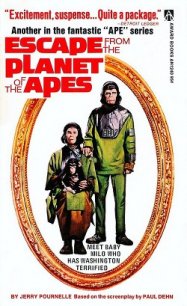Conquest of the Planet of the Apes - Jakes John (читать книги без txt) 📗
The handler reached a narrow ledge where the second floor was set back. He stretched up toward the sill of an open window.
Hand over hand, Caesar clambered up the rungs. He darted along the ledge just as the handler pulled himself up to the window sill. There he teetered, balanced on his belly, then jumped high, seizing the handler’s right ankle. Because of the distance, Caesar’s own feet no longer touched the ledge. He simply gripped the handler’s ankle tightly and hung from it, using his other hand to bring the silver whistle to his mouth, blowing blast after piercing blast.
“Okay, good, let go!” the handler yelled, giving his leg a shake.
Caesar did so, dropping lithely back to the ledge—but continuing to blow the whistle. The handler landed beside him, chuckling as he pried the whistle from between Caesar’s lips. “That’s plenty! Somebody’d buy you for watch duty right now.” In exchange for the whistle he proffered a banana from his pocket. Caesar snatched and peeled it and consumed it in mighty gulps, basking in the admiring gazes of the three other chimps below. Suddenly the floodlights made him think of the circus—and Armando. Playing his little game with his hateful human teachers was no longer a pleasure.
Early one morning toward the end of the second week, Caesar heard an announcement broadcast through the entire training unit floor: “Attention training control. Four females have arrived for insemination. Three gorillas and one chimpanzee. Please select four superior males—three gorillas, one chimp—and send them to the Breeding Annex immediately.”
Caesar didn’t imagine the announcement would have any significance for him until the day keeper unlocked the ceil and motioned him out. Shortly, he was on ground level, being marched down a corridor in company with three immense gorillas.
A glass panel on his left diverted Caesar’s attention. He broke step, paused to glance at a row of tiny cribs lined up on the window’s other side. Smiling, he tapped on the window, trying to attract the attention of one of the tiny, wrinkle-faced, squalling babies. The handler who’d picked up the special group at the elevator gave Caesar a tolerant prod. “Come on, Smiley.”
Caesar moved forward again, unable to erase the haunting memory of the tiny new born apes. A smile, a wave was so little to offer them—considering what lay ahead in their lives.
The corridor angled left. Inset in the walls ahead, Caesar saw a series of apertures. A group of white-garbed men waited for the new arrivals. Each man selected an animal from the quartet, guided him toward one of the entrances. “Playtime, Junior,” Caesar’s attendant said with a cynical grin. He pushed Caesar into the aperture. Its door opened instantly, revealing a similar door a few steps beyond.
Apprehensively, Caesar stepped forward. The rear door closed. Caesar was held a few moments in the lightless space between the walls. Then the inner door admitted him to a high-walled roofless cell, its floor turfed and planted with small shrubs. Well, Caesar thought as he sniffed the breeze, and another, curiously pleasing scent, that was decent of them.
Sitting near one of the shrubs, fingering her right foot and gazing about with what could only be termed a coy expression, was a plump female chimpanzee, young, and not at all unattractive. Then he spotted a large square of black glass in one of the cage walls. The privacy of the shrubbery was a charade. But of course, the callous breeders—the genetic experts—would want to be sure the rutting took place. In order that more slaves might be produced!
A murmur from the female chimp, and the somewhat more elemental reactions of his own body, diverted him from the angry thought. As long as this was inevitable, why not enjoy it?
Blinking against the brightness of the sunny sky, he gave a small shrug of resignation and started walking toward the female, who was now eyeing him with open admiration.
After two weeks, Caesar was sent to an underground center which resembled the one for arriving apes. He passed from station to station, one of a large group of chimps, gorillas, and orangutans being fingerprinted again and funneled toward waiting vans. He walked meekly past a semicircular communications station at which half a dozen male and female operators were speaking on phones and jotting notes.
“For immediate sale, one female orangutan, yes, got it . . .”
“Fully conditioned bedmaker grade A. Yes, we can take her, we have a vacancy.”
“Our policy is to credit you fourteen days after we auction the animal, sir . . .”
Relaxed handlers stationed inside and outside automatic doors watched the apes as they proceeded past the various inspection stations, left the shipment and auction information center, and crossed the outside dock for loading into an assigned truck. On the dock, Caesar relished another brief scent of the free, sweet air of the open countryside. It had been a horrifying, but in many ways instructive, fourteen days. By listening closely to conversations, for instance, he had learned that the animal population of this particular Ape Management Center numbered in the hundreds. And firsthand experience had taught him that all the animals were handled in small groups—an extremely costly business, he had concluded. Government-subsidized. That showed the tremendous emphasis the government placed on training apes to take over the menial jobs in society. How splendid for human beings, he thought bitterly. The result for the apes was cruelty—subjugation—slavery.
And yet, incidents on the first ghastly day in the city, particularly the rebellion of Aldo, indicated that even the scientific experts of this slave-making tower had their failures.
That left one question uppermost in Caesar’s mind as he ducked into the gloom of his assigned van, the perfect picture of the clever, willing, conditioned, chimpanzee. How numerous were the failures of the scientists?
Might there be dozens of potential rebels among the ape population? Hundreds? Even thousands? Caesar’s eyes lit with a harsh speculation as he dropped onto a bench inside the truck. Even the huge gorillas herded in after him did not sit too close. Caesar was not bothering to conceal the rage he’d suppressed for two long weeks.
NINE
Governor Jason Breck’s European-made airlift limousine came sweeping into the curve of the parkway preceded by half a dozen helmeted state security policemen riding conventionally powered cycles. Behind Breck’s vehicle, a second, less ostentatious limousine followed.
Fender flashers rotating, sirens screaming, the braking cycles announced the arrival of an important personage. The pennants on Breck’s limousine came to rest as the airjets shut off. The gleaming vehicle settled to the ground on its chassis cushion. The policemen parked their cycles in three rows of two each, deployed quickly.
Two of the officers stood guard at the admission booth in the center of the semicircular pillared gallery that backed up the arena. The other four disappeared down steps into the arena proper, to clear the governor’s way.
Jason Breck had only decided during luncheon to attend this particular afternoon auction. A secretarial call had prepared his usual place. He frequently dropped in on the auctions, both to observe the quality of the animals being turned out by Ape Management, and for more personal reasons. He made a fair profit from speculative buys and sells; short-term ownership of particularly good specimens.
Immaculately dressed, the governor climbed out as his chauffeur opened the door. His hair was ruffled by the crisp afternoon breeze. The national, state, and city flags, as well as Breck’s own personal ensign of office, snapped on gleaming poles above the gallery. The sky was deep blue, the surrounding exurban countryside a pleasant green.




